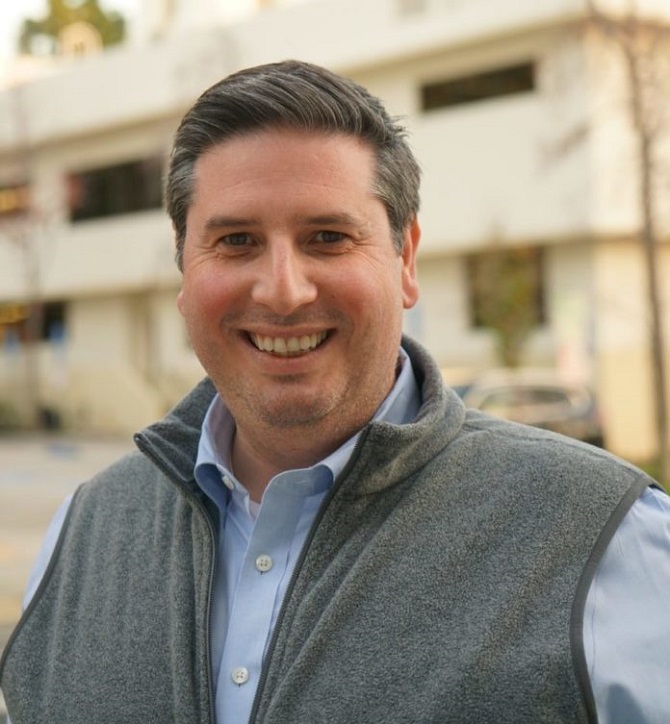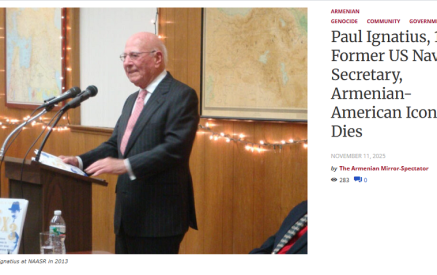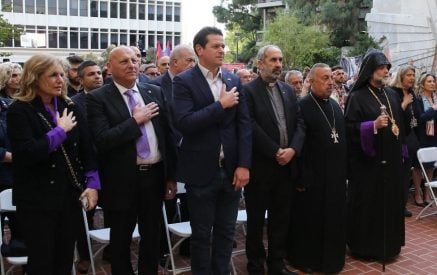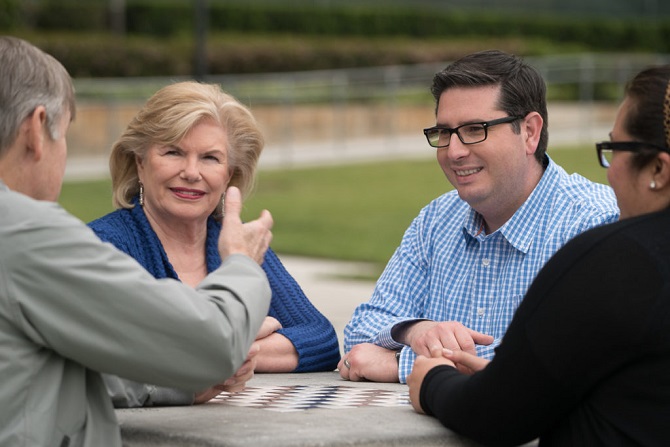GLENDALE — Ardashes “Ardy” Kassakhian, who has served as Glendale City Clerk from 2005 (see Mirror-Spectator), is making his bid for one of the three seats available on Glendale City Council.
He is running in a full field for the March 3 election. Not surprisingly, due to the large Armenian population of Glendale, five out of the eight candidates are of Armenian background, while two are incumbents.
When asked what distinguishes him from the other candidates, including the incumbents, he argued that it was greater pertinent experience, declaring “First of all, no one has attended more City Council meetings than I have. As city clerk, I have been to practically every single City Council meeting in the last 14 years so I understand where Glendale was, where it is today as a city, and where it is headed, if we have the right leadership and work with different parts of our community in a collaborative way.” Added to this, he sits as a state commissioner on the New Motor Vehicle Board, which hears disputes between new automobile salesmen and automobile manufacturers, and teaches political science and government as an adjunct instructor at Glendale Community College.
He has been involved in various local organizations. He is a member of the Glendale YMCA Board and former board member of Glendale Character and Ethics Project, Friends of the Glendale Public Library, and Co-Chair of the Glendale Youth Leadership Conference. He has also been involved in Armenian community politics.
Read also
Kassakhian said, “I am the only candidate in this election who has actually written a law and helped craft legislation that was signed by the governor.” This was a recent law that reversed the ballot order for elections to place local races such as for city council, school boards or college boards prior to federal ones, which draws more attention to these sometimes neglected but important positions.
The Campaign
Kassakhian is still working fulltime as city clerk (in between sections of the Mirror interview, he was giving an explanation about how the new electronic voting machines in Los Angeles County work to an Armenian cable television show), so he must do his campaigning on weekends and nights. This is why he has volunteers and staff. He has a campaign manager and campaign consultant running the volunteers, whose numbers, he said, may fluctuate daily from 10 to over 30.
Most of the work is done from 5 p.m. to 8 p.m., in order to catch people in their homes in the evenings. The volunteers make telephone calls, walk through neighborhoods and knock on doors. Kassakhian himself does this, and said, “I find that to be the most rewarding and exciting part of the campaign.”
The digital era has made it more difficult to make this type of personal connection, Kassakhian said. People usually expect a call or text on their cell phone before accepting visitors and are more reluctant to open the door after a random knock. Presumably, some also screen out calls from people they do not know personally.
The campaign does do digital marketing and place advertisements with Armenian cable television stations. For the broader electorate, Kassakhian said, “With music streaming and an a la carte way of consuming news, music or any type of entertainment, it has become harder and harder to figure out where you go, how you determine who your audience is, in order to get the most out of your investment in this.” Nonetheless, social media is more likely to reach people, he said, than print newspapers, perhaps with the exception of Armenian newspapers, though the latter tend to reach an older demographic group.
One lesson that his campaign has drawn from the last presidential election , Kassakhian said, is not to take the youth for granted. The Bernie Sanders campaign awakened great interest in this group of voters that no one had expected.
Issues, Ideology and Organized Interest Groups
The main issues of the campaign, Kassakhian said, are those that concern voters: “traffic congestion, the overdevelopment of the downtown and the fear that it will spread to other parts of the city, and neighborhood safety. That is the meat and potatoes of local government. People want to make sure their trash gets picked up, that their water and electricity bills do not spike. So those are the issues that come up.”
Nonetheless, he said that during this contentious time in national American politics, broader issues and ideology do come up too. Kassakhian noted, “Inevitably, when I talk to voters, I have people who bring up their concerns about climate change and environmental policies, and what the city will do about them.” Gun control and public vs. private education are other such issues.
In fact, when asked whether there are PACs or outside funding groups involved in this municipal campaign, Kassakhian replied affirmatively. He said, “There are groups that are making endorsements and that are spending money. What those are yet is still not 100 percent clear. It will be clear as the reporting deadlines come around.”
He gave as examples the Sierra Club, which has endorsed several candidates and will probably work to increase awareness of this among their members, realtor associations, and various unions. Kassakhian has benefitted from the endorsement of the Sierra Club Angeles chapter and the Glendale Environmental Coalition.
The last time Kassakhian attempted to run for an office at a “higher” level, it was for State Assembly in 2016. He lost that race and one reason was that supporters of charter schools aggressively supported his opponent, while he came down on the side of public education. The general atmosphere on this topic changed to greater support for public school teachers. In the current city council election this does not seem to be a significant issue of contention, but the Glendale Teachers Association did endorse Kassakhian’s campaign in January.
Kassakhian said he has made support for public schools a priority because of their impact on the quality of life. He added, “One of my main platform issues for this cycle is bringing our police school resource officers into all of our middle schools and high schools, particularly in the wake of a lot of incidents of violence in various schools in various communities across the country. When I was young, we had a full-time school resource officer on campus and now we have a few that rotate between all the schools. They are not really on campus all the time.”
American political party clubs and organizations are active in local elections like this one. Kassakhian said that in Glendale it is primarily Democratic Party groups that are active. Not coincidentally, he said that, “Overwhelmingly my support comes from Democratic organizations and institutions because I have been active in those institutions and they now me. Certainly they are taking a more active role in these races. In Los Angeles, where the local elections were consolidated with the bigger elections, long before Glendale, that has always been the case. There has always been a partisan tinge to it. In Glendale we are just seeing that right now in this cycle, and we will see how it works out in the future.”
The majority of voters in Glendale seem to be Democrats, and Kassakhian said that the majority of candidates for city council also appear to be registered Democrats. The LA County Democratic Party has endorsed Kassakhian and two other city council candidates at present, but Kassakhian said, “An endorsement is only as good as the way you use it.” By law, the party cannot coordinate its activity with these candidates, but Kassakhian said that his campaign is using the endorsements to its best advantage.
Kassakhian has also garnered the endorsements of many prominent politicians, including Congressman Adam Schiff (D-CA), former Los Angeles County Supervisor Michael D. Antonovich, and California State Senator Anthony Portantino.
Housing and Real Estate Issues
Real estate interests play a significant role in the election. Kassakhian said that this is “because of the homelessness crisis, the great attention placed on housing and affordable housing, and the rising cost of housing, whether in renting or owning a home. Certainly people in the real estate industry are watching all races very closely and look at local races as places where they need to make their voices heard. Similarly, in Glendale some of the tenants have organized into a tenants union.”
In the 2016 race, Kassakhian received financial support from realtors, but in this election they chose to go with the incumbents and someone who was the former chairman of their local organization. Kassakhian commented that he still has a lot of support among the realtor community. At the same time the Glendale Tenants Union rates Kassakhian “A-”, which is the highest rating of all city council candidates.
He said that support from realtors and tenants is not mutually exclusive. He said he believed one reason why the tenants rated him so highly was his help in explaining how to pass an initiative in Glendale, though their two attempts did not succeed.
At the same time, he said, “The realtors supported me because, look, I understand economics. I understand that a healthy real estate market is good for cities, communities and families. Quite honestly, it is in our best interest to have more homes built in California. Those two things are not opposed to one another and I do not think those two groups are opposed. I think people want to pit them one against the other, but where would landlords be without tenants and where would tenants be without landlords.”
Kassakhian feels that after a period of growth in the real estate field, it is time to put the breaks on development and deal with the impact of what has happened, such as heavy traffic in downtown during rush hour. Just building more, he said, is not a solution to the housing need because without coordination with neighboring areas this would just attract more people while prices remain high. Aside from taking a regional approach, he said, it is necessary to build more workforce housing for police, firefighters, nurses, and teachers, people who provide essential services to Glendale but who are priced out of renting in the city at present.
He said, “I don’t see the need for massive developments. I think we need to focus more on affordable housing and that has to be done with public-private partnership between the city and nonprofits and any of those private companies that work in this arena.” He gave as an example the Ace 121 affordable housing project for artists who live and work in Glendale which the YMCA built while Kassakhian was on its board.
Rent subsidies, he said, would only be “a band-aid on a bullet wound,” since they would be based on sales tax revenue. When the retail market goes down, this money would go away. The state of California did, he pointed out, recently pass a law placing limits on annual rent increases.
Aside from grappling directly with development and housing strategies, Kassakhian has proposed a way to deal with conflicts between landlords and tenants. While this on the surface appears to be an issue for the courts, in Glendale in practice the city council has to deal with it because tenants, and, less frequently, landlords, appeal to the city council on such matters. Kassakhian said that “the perception of the city council and the role that a city council member plays has not fully matured in the minds of many voters who think that anyone in any government position has access to making and influencing any government policy. Especially for minorities who come from countries and communities where the government was not very structured, authority was spread out and corruption was widespread, there is the perception that, well, the city clerk can help me with my Section 8 housing or the council member should be able to get my son or daughter a job….This is on a weekly basis the type of concerns and questions we get.”
The court system can take a long time to resolve tenant-landlord disputes. Consequently, Kassakhian has proposed a tenant-landlord commission, composed of members of both groups, to mediate in such disputes and save the city council from delving into minutia.
The Armenian Factor
Kassakhian faced xenophobia and even threats in his 2016 run for the State Assembly as an Armenian American. In this campaign, this seems to have decreased despite the rise in incidents in various other parts of the country. Kassakhian said, “This has been around for as long as there have been minority groups here in Glendale, whether it was African American, Hispanic, Armenian, or Asian. I believe that there is xenophobia, but I believe the vast majority of Glendale residents all want the same thing and are not looking to pick a side or divide themselves along ethnic-racial lines.”
At the most, Kassakhian reported, there are people who say there are too many Armenians in Glendale or on the council, or that if someone is Armenian, he does not have my vote. These make up a very small percentage of the responses his campaign has been receiving. He speculated that in his prior race, he was running in a much wider area, including Glendale, Burbank, Hollywood, Silverlake, La Cañada, and La Crescenta. In the Glendale city election, he said, “I think that if you have lived in Glendale and you don’t realize there are Armenians and Armenians are an active voice here, you have had blinders on for the last thirty years.”
While Kassakhian feels most Armenians care about the same everyday issues as other Glendale residents, there is one issue that Kassakhian is promoting which specifically concerns Armenians. He said, “I think one of the most important issues for the community as a whole is the construction and completion of the Armenian American Museum in downtown Glendale…I believe that it needs to be a priority, it needs to be built soon and the city should take an active role in its completion.”
He finds it important, he said, “not just so that other individuals who are not Armenian can learn about our heritage, but Armenians who are here and have been here for multiple generations have something with which to culturally tether themselves to their past, and learn about where Armenians have come from, so we do not become an assimilated footnote in the history of the American melting pot.” Of course the Armenian immigrant experience is part of the broader American immigrant experience, so it will be relevant to all peoples.
A plus, in Kassakhian’s eyes, is that the committee organizing the museum is very inclusive of different segments of the Armenian community.
To the Finish Line
Kassakhian said that after his 2016 Assembly loss, “One of the things I have learned is that you have to be honest and sincere about what you believe and what you want to do, and if people agree with those views and it happens to be your time, then you will succeed. I am not someone who will change my views and my principles because I lost one election and I want to win the next one.”
At present, he said, the campaign for city council is going well but he does not want to take anything for granted. Kassakhian said, “Being a father of a young child and having the duties that I have at City Hall and my family, it takes a certain amount of effort to try to balance everything to do it well. So far, it has been fine. It will get more difficult as we get close to election day, but I am happy with what we are doing and I expect good results. What really matters most is that our community, especially Armenian-American voters, realize the importance of this election and go out and vote.”
Main photo: Ardashes “Ardy” Kassakhian {photo Aram Arkun}






















































